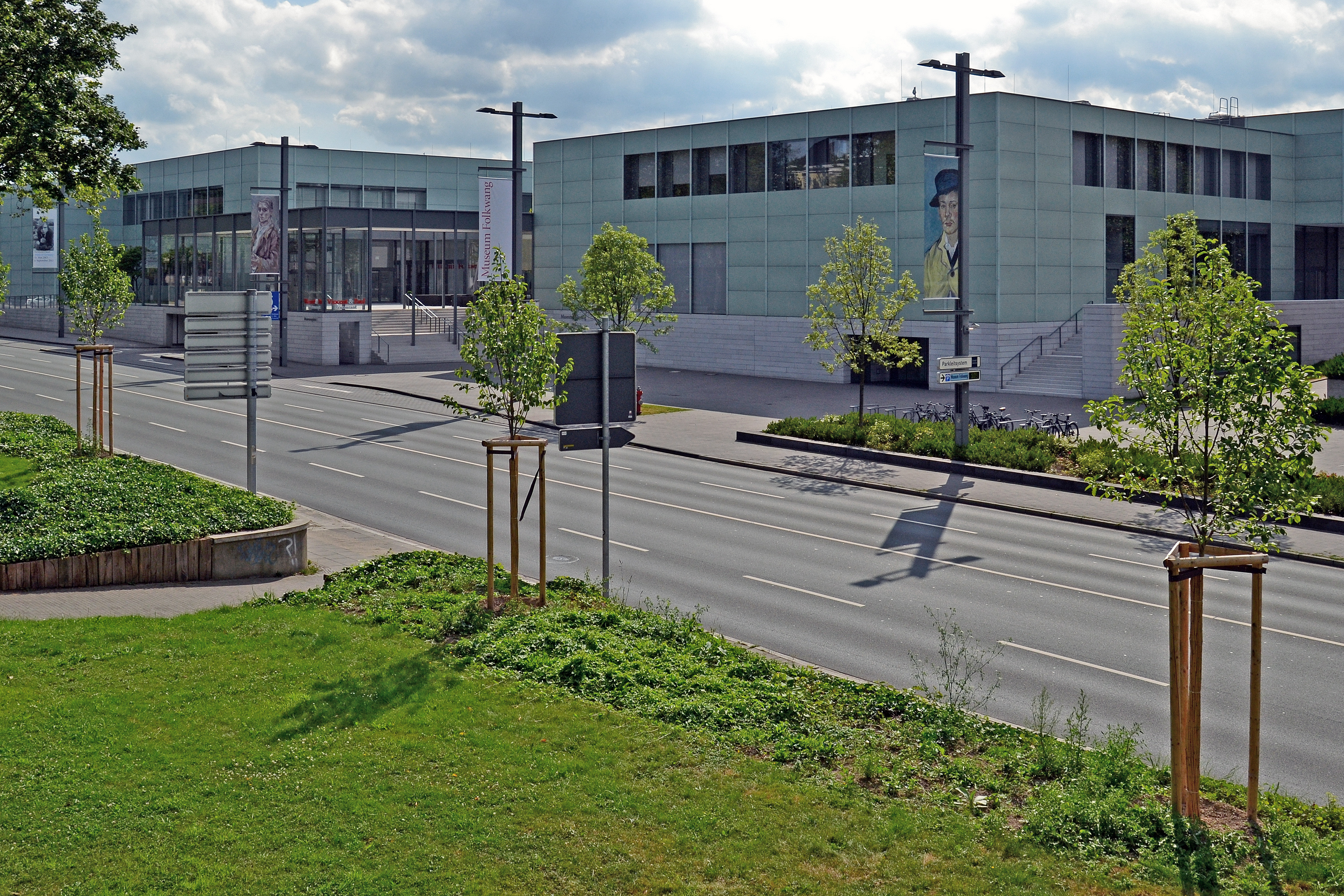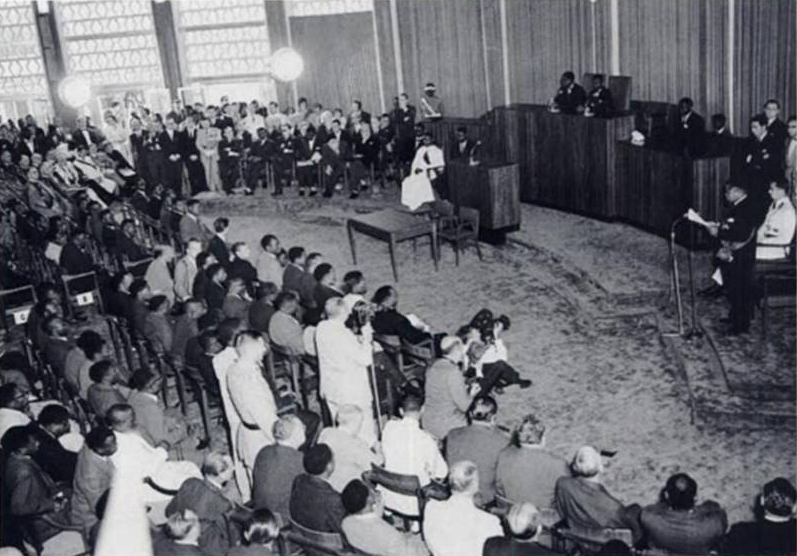|
Ambroise Boimbo
Ambroise Boimbo (died 1981) was a Congolese citizen who snatched the ceremonial sword of King Baudouin I of Belgium on June 29, 1960, in Léopoldville (now Kinshasa) on the eve of the independence of the Belgian Congo. He was a former soldier who originated from Monkoto, Tshuapa. The king's entourage was driving from the airport into the city when it slowed to enable the monarch to stand and salute the flag of an honour guard of the Force Publique drawn up by the side of the road. A widely published photograph, taken by journalist Robert Lebeck, shows an exuberant Ambroise Boimbo, in jacket and tie, flourishing the sword while Baudouin and Congolese President Joseph Kasa-Vubu appear unaware of the incident. Further photographs taken by Lebeck show Boimbo encircled by Belgian and Congolese colonial gendarmes, as they wrestled him to the ground. According to media reports the "nationalist demonstrator" was taken away in a police vehicle but released later the same day at the king ... [...More Info...] [...Related Items...] OR: [Wikipedia] [Google] [Baidu] |
Monkoto
Monkoto is a territory of the Democratic Republic of the Congo. It is located in Tshuapa Province Tshuapa is one of the 21 new provinces of the Democratic Republic of the Congo created in the 2015 repartitioning. Tshuapa, Équateur, Mongala, Nord-Ubangi, and Sud-Ubangi provinces are the result of the dismemberment of the former Équateur .... The village of Monkoto (Coordinates:) is within Monkoto Territory. It is on the Momboyo river and is served by Monkoto Airport. References Retrieved December 8, 2010. {{coord, 1, 37, S, 20, 39, E, type:adm2nd_source:kolossus-frwiki, display=title Populated places in Tshuapa ... [...More Info...] [...Related Items...] OR: [Wikipedia] [Google] [Baidu] |
Gendarme
Wrong info! --> A gendarmerie () is a military force with law enforcement duties among the civilian population. The term ''gendarme'' () is derived from the medieval French expression ', which translates to "Man-at-arms, men-at-arms" (literally, "armed people"). In France and some Geographical distribution of French speakers, Francophone nations, the gendarmerie is a Military branch, branch of the armed forces that is responsible for internal security in parts of the territory (primarily in rural areas and small towns in the case of France), with additional duties as military police for the armed forces. It was introduced to several other Western European countries during the Napoleonic Wars, Napoleonic conquests. In the mid-twentieth century, a number of former French League of Nations mandate, mandates and colonial possessions (such as Lebanon, Syria, the Ivory Coast and the Republic of the Congo) adopted a gendarmerie after independence. A similar concept exists in E ... [...More Info...] [...Related Items...] OR: [Wikipedia] [Google] [Baidu] |
1980s Deaths
__NOTOC__ Year 198 (CXCVIII) was a common year starting on Sunday (link will display the full calendar) of the Julian calendar. At the time, it was known as the Year of the Consulship of Sergius and Gallus (or, less frequently, year 951 ''Ab urbe condita''). The denomination 198 for this year has been used since the early medieval period, when the Anno Domini calendar era became the prevalent method in Europe for naming years. Events By place Roman Empire *January 28 **Publius Septimius Geta, son of Septimius Severus, receives the title of Caesar. **Caracalla, son of Septimius Severus, is given the title of Augustus. China *Winter – Battle of Xiapi: The allied armies led by Cao Cao and Liu Bei defeat Lü Bu; afterward Cao Cao has him executed. By topic Religion * Marcus I succeeds Olympianus as Patriarch of Constantinople (until 211). Births * Lu Kai (or Jingfeng), Chinese official and general (d. 269) * Quan Cong, Chinese general and advisor (d. ... [...More Info...] [...Related Items...] OR: [Wikipedia] [Google] [Baidu] |
Stern (magazine)
''Stern'' (, German for "Star") is an illustrated, broadly left-liberal, weekly current affairs magazine published in Hamburg, Germany, by Gruner + Jahr, a subsidiary of Bertelsmann. Under the editorship (1948–1980) of its founder Henri Nannen, it attained a circulation of between 1.5 and 1.8 million, the largest in Europe's for a magazine of its kind. Unusually for a popular magazine in post-war West Germany, and most notably in the contributions to 1975 of Sebastian Haffner, ''Stern'' investigated the origin and nature of the preceding tragedies of German history. In 1983, however, its credibility was seriously damaged by its purchase and syndication of the forged Hitler Diaries. A sharp drop in sales anticipated the general fall in newsprint readership in the new century. By 2019, circulation had fallen under half a million. History and profile Journalistic style Henri Nannen produced the first 16-page issue (with the actress Hildegard Knef [...More Info...] [...Related Items...] OR: [Wikipedia] [Google] [Baidu] |
Mary Sibande
Mary Sibande (born 11 April 1982) is a South African artist based in Johannesburg. Her art consists of sculptures, paintings, photography, and design. Sibande uses these mediums and techniques to help depict the human form and explore the construction of identity in a postcolonial South African context. In addition, Sibande focuses on using her work to show her personal experiences through Apartheid. Her art also attempts to critique stereotypical depictions of women, particularly black women. Early life Sibande was born in Barberton in apartheid South Africa and was raised by her grandmother. Her mother was a domestic worker herself, and her father was in the South African Army. She did not know her father when she was younger but got to know him when she was a teenager. Because her mother was a domestic worker she pays homage to domestic workers with her artworks. Artworks such as the ones from her exhibit, "Long Live the Dead Queen". Sibande would describe her childhood as bei ... [...More Info...] [...Related Items...] OR: [Wikipedia] [Google] [Baidu] |
South Africa
South Africa, officially the Republic of South Africa (RSA), is the southernmost country in Africa. It is bounded to the south by of coastline that stretch along the South Atlantic and Indian Oceans; to the north by the neighbouring countries of Namibia, Botswana, and Zimbabwe; and to the east and northeast by Mozambique and Eswatini. It also completely enclaves the country Lesotho. It is the southernmost country on the mainland of the Old World, and the second-most populous country located entirely south of the equator, after Tanzania. South Africa is a biodiversity hotspot, with unique biomes, plant and animal life. With over 60 million people, the country is the world's 24th-most populous nation and covers an area of . South Africa has three capital cities, with the executive, judicial and legislative branches of government based in Pretoria, Bloemfontein, and Cape Town respectively. The largest city is Johannesburg. About 80% of the population are Black South Afri ... [...More Info...] [...Related Items...] OR: [Wikipedia] [Google] [Baidu] |
De Morgen
''De Morgen'' (Dutch for ''The Morning'') is a Flemish newspaper with a circulation of 53,860. The paper is published in Antwerp, Belgium. History and profile ''De Morgen'' originates from a merger in 1978 of two socialist newspapers ' (meaning "Onwards" in English) and ' (meaning "People's Newspaper" in English). The ''Vooruit'' was founded in Ghent by Edward Anseele and appeared the first time on 31 August 1884, just before the foundation of the Belgian Labour Party (Dutch: Belgische Werklieden Partij) in 1885. ''De Morgen'' was modelled on French daily ''Liberation''. The paper is published by De Persgroep which also publishes ''Het Laatste Nieuws''. ''De Morgen'' presents itself as an independent and progressive newspaper and a more dynamic alternative to its two competitors in the Flemish market, ''De Standaard'' and ''De Tijd''. On the other hand, the paper is described as a leftist and socialistic publication. According to the former editor-in-chief An editor-in-chief ... [...More Info...] [...Related Items...] OR: [Wikipedia] [Google] [Baidu] |
KU Leuven
KU Leuven (or Katholieke Universiteit Leuven) is a Catholic research university in the city of Leuven, Belgium. It conducts teaching, research, and services in computer science, engineering, natural sciences, theology, humanities, medicine, law, canon law, business, and social sciences. In addition to its main campus in Leuven, it has satellite campuses in Kortrijk, Antwerp, Ghent, Bruges, Ostend, Geel, Diepenbeek, Aalst, Sint-Katelijne-Waver, and in Belgium's capital Brussels. KU Leuven is the largest university in Belgium and the Low Countries. In 2017–18, more than 58,000 students were enrolled. Its primary language of instruction is Dutch, although several programs are taught in English, particularly graduate and postgraduate degrees. KU Leuven consistently ranks among the top 100 universities in the world by major ranking tables. As of 2021, it ranks 42nd in the ''Times Higher Education'' rankings, 70th according QS World University Rankings, 87th according to the Sh ... [...More Info...] [...Related Items...] OR: [Wikipedia] [Google] [Baidu] |
Museum Folkwang
Museum Folkwang is a major collection of 19th- and 20th-century art in Essen, Germany. The museum was established in 1922 by merging the Essener Kunstmuseum, which was founded in 1906, and the private Folkwang Museum of the collector and patron Karl Ernst Osthaus in Hagen, founded in 1902. The term ''Folkwang'' derives from the name of the afterlife meadow of the dead, Fólkvangr, presided over by the Norse goddess Freyja. Museum Folkwang incorporates the Deutsche Plakat Museum (German poster museum), comprising circa 340,000 posters from politics, economy and culture. During a visit in Essen in 1932, Paul J. Sachs called the Folkwang "the most beautiful museum in the world." In 2007, David Chipperfield designed an extension, which was built onto the older building. History Museum Folkwang in the Nazi era , director of the museum in the 1920s and 1930s, and earlier directors, had made the museum's collection of modern art into one of the leading collections in the worl ... [...More Info...] [...Related Items...] OR: [Wikipedia] [Google] [Baidu] |
Congolese Independence Speech
The Speech at the Ceremony of the Proclamation of the Congo's Independence was a short political speech given by Patrice Lumumba on 30 June 1960 at the ceremonies marking the independence of the Republic of Congo (the modern-day Democratic Republic of the Congo) from Belgium. It is best known for its outspoken criticism of colonialism. Lumumba, the first Congolese Prime Minister, gave the address during the official independence commemorations at the ''Palais de la Nation'' in Léopoldville (modern-day Kinshasa). The ceremony was intended to mark the harmonious end of Belgian rule and was attended by both Congolese and Belgian dignitaries, including King Baudouin. Lumumba's speech, which was itself unscheduled, was in large part a response to Baudouin's speech which argued that the end of colonial rule in the Congo had been depicted as the culmination of the Belgian "civilising mission" begun by Leopold II in the Congo Free State. Lumumba's speech, broadcast live on the radio ... [...More Info...] [...Related Items...] OR: [Wikipedia] [Google] [Baidu] |
Joseph Kasa-Vubu
Joseph Kasa-Vubu, alternatively Joseph Kasavubu, ( – 24 March 1969) was a Congolese politician who served as the first President of the Democratic Republic of the Congo (then Republic of the Congo) from 1960 until 1965. A member of the Kongo ethnic group, Kasa-Vubu became the leader of the Alliance des Bakongo (ABAKO) party in the 1950s and soon became a leading proponent of Congo's independence from Belgian colonial rule. He then became the country's first president in a coalition with Patrice Lumumba as prime minister. Less than a week after the country's independence in 1960, their government was confronted by the Congo Crisis, a series of secession movements and rebellions. During this time, Kasa-Vubu, a centrist, clashed with the leftist Lumumba when the latter ordered assistance from the Soviet Union, leading to a political deadlock. Kasa-Vubu then dissolved Lumumba's government, accusing it of having communist sympathies. Following Lumumba's execution in 1961, Kasa- ... [...More Info...] [...Related Items...] OR: [Wikipedia] [Google] [Baidu] |




